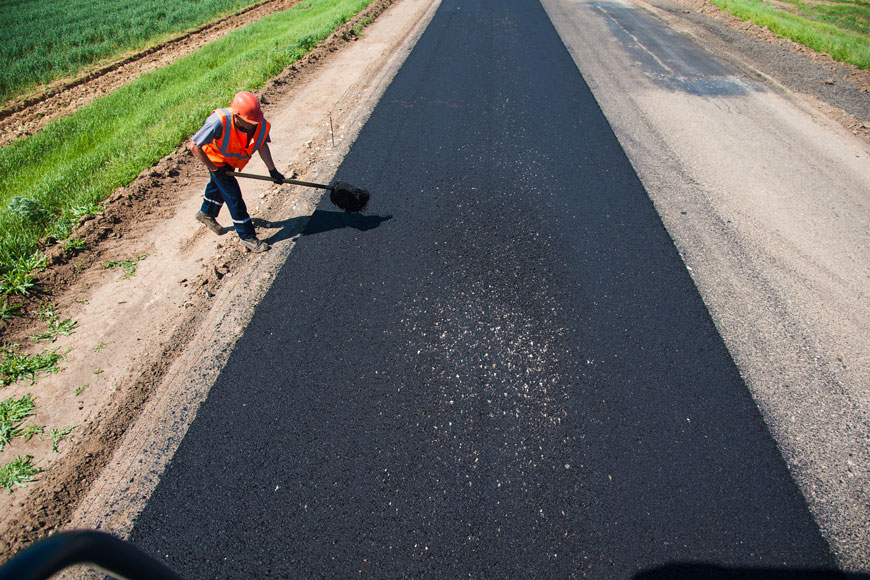Discovering the Ecological Benefits of Hot Mix Asphalt
The application of Warm Mix Asphalt in infrastructure tasks provides an engaging instance for sustainable development and ecological stewardship. By diving right into the elaborate information of its production processes and the innovative use of recycled products, a much deeper understanding arises of exactly how this technology surpasses simple surface area applications. The ecological benefits of Warm Mix Asphalt prolong far beyond first perceptions, offering a nuanced viewpoint on exactly how this material can lead the way for a greener future.

Decreased Greenhouse Gas Emissions
Warm Mix Asphalt manufacturing provides a considerable reduction in greenhouse gas discharges compared to various other sidewalk materials. The manufacturing procedure of Warm Mix Asphalt involves heating the mixture of aggregate and asphalt binder to heats. This process requires much less energy compared to the manufacturing of different pavement products, causing reduced greenhouse gas exhausts. In addition, using recycled materials in Hot Mix Asphalt further contributes to decreasing its environmental impact. By incorporating reclaimed asphalt pavement and recycled asphalt shingles right into the mix, the demand for virgin products is minimized, leading to power cost savings and reduced exhausts related to extraction and processing.
Studies have shown that Warm Mix Asphalt pavements have a smaller carbon impact over their life process compared to other pavement alternatives. The durability and recyclability of Hot Mix Asphalt better boost its environmental benefits by decreasing the need for frequent upkeep or substitute, thus preserving sources and minimizing exhausts related to restoration activities.
Power Effectiveness and Conservation
The manufacturing procedure of Warm Mix Asphalt not just minimizes greenhouse gas exhausts yet likewise adds substantially to power effectiveness and conservation efforts. Energy efficiency is a key advantage of Warm Mix Asphalt manufacturing contrasted to various other pavement types. The sturdiness of Warm Mix Asphalt decreases the frequency of upkeep and reconstruction, leading to lasting energy financial savings.
Lasting Pavement Solutions

One trick facet of sustainable pavement solutions is making use of recycled materials such as reclaimed asphalt pavement (RAP) and recycled asphalt shingles (RAS) By incorporating these materials right into the asphalt blends, the demand for virgin resources is decreased, resulting in lower energy intake and greenhouse gas discharges during manufacturing. In addition, the reuse of these products aids draw away waste from landfills, adding to a much more circular and lasting economic situation.
Furthermore, lasting sidewalk solutions focus on enhancing sidewalk style to enhance efficiency and longevity. Strategies such as cozy mix asphalt (WMA) and rock mastic asphalt (SMA) improve the durability and strength of pavements, lowering the requirement for constant repair services and replacements. By implementing these cutting-edge techniques, facilities developers can develop pavements that not only satisfy high-performance criteria but additionally minimize their ecological impact.
Minimized Environmental Effect
Hot mix asphalt, in specific, uses a number of advantages that add to reducing the overall environmental footprint of road facilities. One vital aspect is the recyclability of asphalt, which can be recycled numerous times without endangering its quality - Regrading.
Additionally, the production of hot mix asphalt emits lower levels of greenhouse gases contrasted to various other sidewalk materials, making it a more ecologically pleasant alternative. The power efficiency of asphalt plants has likewise boosted for many years, leading to decreased fuel usage and reduced exhausts. In addition, the smooth surface of warm mix asphalt lowers rolling resistance for lorries, causing lower fuel usage and reduced air pollution from lorry emissions.
Contribution to Climate Modification Reduction
Hot mix asphalt plays a crucial duty in mitigating climate change through its lasting residential properties and reduced environmental impact. One significant payment to environment modification mitigation comes from the power efficiency of hot mix asphalt manufacturing. Contrasted to other sidewalk alternatives, the production procedure for hot mix asphalt eats much less energy and gives off check here lower degrees of greenhouse gases, therefore reducing its total carbon impact.
Furthermore, warm mix asphalt's ability to mirror sunshine, referred to as albedo, helps in lowering urban heat island results. By lessening warmth absorption and retention, warm mix asphalt sidewalks can reduce the demand for air conditioning in urban locations, subsequently reducing greenhouse gas exhausts connected with energy intake for cooling down purposes.
Furthermore, the durability and recyclability of warm mix description asphalt even more boost its environment adjustment mitigation abilities. Regrading. The lengthy life-span of asphalt pavements lowers the need for frequent repair work or substitutes, inevitably lowering the carbon discharges linked to roadway upkeep activities. Furthermore, the recyclability of asphalt materials lessens the demand for virgin sources and lowers the ecological influence of pavement building, lining up with lasting methods for environment change mitigation.
Conclusion
To conclude, the ecological benefits of Warm Mix Asphalt show its substantial contribution to lowering greenhouse gas emissions, saving power, and decreasing environmental influence. This sustainable sidewalk remedy aligns with environment modification mitigation initiatives, advertises source conservation, and boosts framework development. By using recycled products, energy-efficient manufacturing procedures, and durable design, Hot Mix Asphalt plays an essential function in cultivating an extra eco-friendly technique to framework building and construction.
The manufacturing procedure of Warm Mix Asphalt entails heating up the mix of aggregate and asphalt binder to high temperature levels. By incorporating recovered asphalt sidewalk and recycled asphalt roof shingles into the mix, the need for virgin products is reduced, leading to power cost savings and decreased emissions linked with removal and processing.
One trick aspect of sustainable pavement options is the usage of recycled materials such as reclaimed asphalt pavement (RAP) and recycled home asphalt shingles (RAS) Strategies such as warm mix asphalt (WMA) and stone mastic asphalt (SMA) enhance the sturdiness and durability of pavements, reducing the demand for constant repairs and replacements. Contrasted to various other pavement options, the production procedure for hot mix asphalt takes in less power and produces reduced degrees of greenhouse gases, therefore reducing its total carbon footprint.